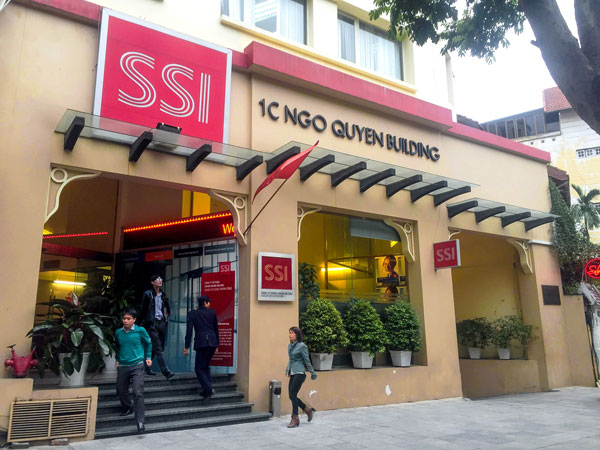 Economy
Economy


|
| People pass by SSI Securities Corporation's office on Ngô Quyền Street, Hà Nội. — Photo nhadautu.vn |
HÀ NỘI — After having declined for four straight weeks, the Vietnamese market may rebound in December as analysts and securities companies expect that cheaper shares will attract hungry investors amid the world’s volatility.
The benchmark VN-Index on the Hồ Chí Minh Stock Exchange was almost unchanged on Friday as it gained narrowly by 0.03 per cent to end last week at 963.56 points.
Việt Nam’s benchmark VN-Index lost a total of 6.0 per cent in four trading weeks since touching the one-year high of nearly 1,024.91 points on November 6.
Before touching that amount, the VN-Index had been boosted by confidence in the possibility of a signed US-China trade truce and strong earnings reports produced by large-cap companies.
But after that, the market went into a correction phase with large-cap stocks being hit by increased selling from investors. Among the causes were concerns about the delay, or worse the cancellation, of the US-China deal.
Any recovery days during this period proved to be technical only and investors were very cautious and unwilling to participate in the market trading, according to SSI Research.
In November, foreign investors net-sold a total of VNĐ104 billion (US$4.6 million) worth of local shares on HoSE. That was also the fourth month of foreign net selling on the stock exchange.
Net foreign selling continued in the first week of December as foreigners offloaded a net value of VNĐ529 billion on HoSE, focusing on selling shares of consumer firm Masan (MSN).
But SSI Research forecast the downtrend would benefit the local market as share prices had been demoted to more attractive ranges.
Trailing price-to-earnings per share (P/E) ratio of the VN-Index had fallen to 15.74 – the lowest since February 2019, SSI Research said in a note.
That means local stocks are becoming cheaper and more attractive to investors as the market’s average base price has dropped.
One positive signal was increased trading liquidity, which proved investors were willing to buy in stocks when the VN-Index fell sharply, thus boosting the market, SSI Research noted.
According to Yuanta Việt Nam Securities Co (YSVN), the Vietnamese market’s P/E is lower than other regions such as Thailand (18.8), Indonesia (18.8) and the Philippines (16.8) while return on equity (ROE) ratio in Việt Nam is 14.75 per cent – the highest in the region.
Therefore, YSVN expects foreign investment fund would see Vietnamese stocks as opportunities in the short term and foreign capital would help boost the index to 1,000 points at the end of the year.
After touching the support level of 950 points, the VN-Index declined at a slower pace and is now accumulating before leaping again, Nguyễn Hồng Khanh, director of market analysis department at Vietnam International Securities Co (VIS), told tinnhanhchungkhoan.vn.
Some investors may want to make go-ahead runs as they look for stocks with good quarterly and yearly earnings prospects and good preparation for next year, Khanh said.
Some sectors are namely steel, real estate, construction, banking and retail, he added.
But both SSI Research and YSVN warned the market would not run smoothly in December as worries about the US-China trade war remain.
The global markets are still at high risk, posing negative impact on the Vietnamese market, SSI Research said.
The market sentiment will be undermined by worries about the US-China trade war with the next deadline for US tariffs on Chinese imports to take place on December 15, SSI Research said.
If the US government determines to realise the tariffs on schedule, it would likely escalate the tensions between the two largest economies, YSVN said. — VNS




